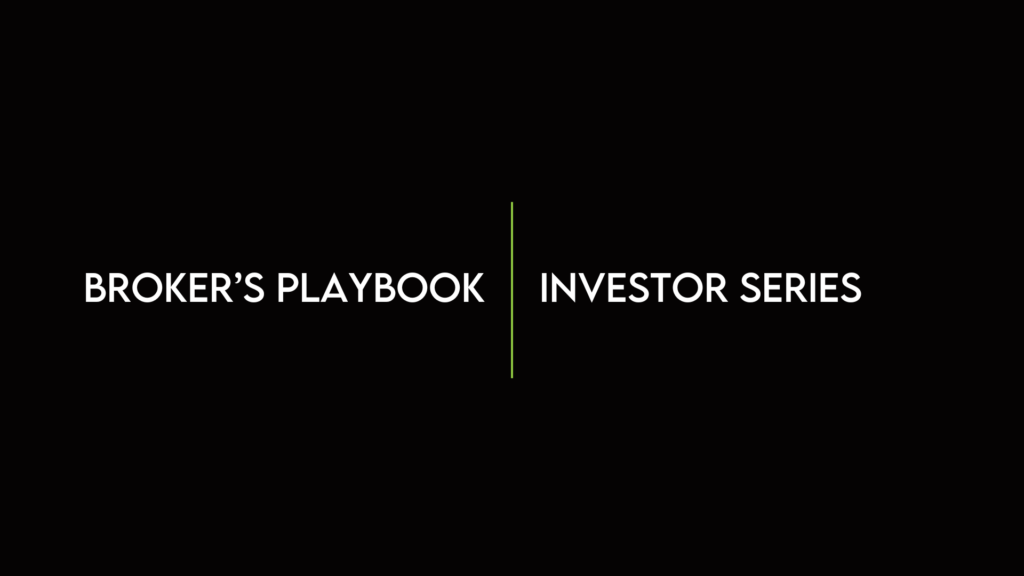Welcome to Brokers Playbook Nation! Join Simeon and the Cara Hirsch from Hirsch and Associates, as they discuss the ever changing real estate market and how recent interest rates have impacted consumer behavior across Canada. Get insight into a different world than what you’re used to and hear exclusive advice from a reputable real estate expert. Don’t miss this captivating conversation about how you can succeed in the current market!
Simeon Papailias: Hello once again to all my brothers and sisters on Broker’s Playbook Nation. This is Simeon and today I have my good friend, colleague and the Queen of pre-construction with me. This is not her first appearance on Broker’s Playbook. It is Cara Hirsch from Hirsch and Associates. Cara, welcome to the show.
Cara Hirsch: Thank you for having me.
Simeon Papailias: It is a very interesting time in our market, and I don’t think we could have had better timing in getting you back onto Broker’s Playbook. It is imperative after September, we’ve seen finally the market kind of find its identity, meaning the Bank of Canada has finally recognized that they’ve done enough. They saw the first big contraction in economy, which led them to hold rates at 5%. Stopping that. Trend word up on interest rates. That has literally. Taking the air out of the market for the entire summer, and has really changed investor and consumer behavior in the entire country, coast to coast. I count on you personally on many things from a market insight, because you work in a different world. As a real estate agent, as a resale residential real estate agent, as a commercial, I’m a commercial agent. We don’t deal every single day with developers with planners with. Capital companies that invest hundreds of millions into single projects. We work with clients every day. We understand consumer behavior. You see things from a different lens. Can you please. Explain to our entire audience kind of what your world looks like for them to understand why listening to some of the suggestions that you’re going to make today are important.
Cara Hirsch: Yeah, I think the biggest thing that a lot of people don’t realize is how long you actually work on a project before it gets to market. So before I even come to you or to a consumer with a product behind the scenes, we’ve been minimum probably 18 to 24 months.
Simeon Papailias: But you’re a listing agent. Yes. So as de facto, what is your job description? You are a listing agent to developers. Correct. So for 18 months prior to anything coming to the market, what does that look like.
Cara Hirsch: So, you know, developer will start from the very beginning. They’re looking at a piece of land. They see a site. They they’re interested in it. They want to buy it. They come to us for our clients to ask, what do you think we could sell this for if we could build. And let’s just use a hypothetical of 400 units, an average size of this. What do you think our average price per square foot could be? And that Intel that we give them then determines whether they’re going to move forward on that land or if they’re in due diligence, whether they’re firm on that land. The moment that they firm on that land or everything goes through, they’re going to start the process of the city planning, planning. Some clients will get us a little bit later involved. Preferably. We like to be involved from the beginning, because then we can create a sweet mix that’s tailored to exactly what the consumers are looking for. And we start that a lot of savings for the developer because they do it from the beginning. They don’t have to go back.
Simeon Papailias: And this is very micro market driven as well. Like the sweet mix has to be right for that piece of land. Correct.
Cara Hirsch: So we’ll do our research. We’ll look we’ll figure out what where is this site, for example, I’m not going to say to do the exact same sweet mix size in downtown Toronto as I am in something like St Catherine’s or Hamilton or those areas. Right. There’s some fundamental, some things that are still the same, but fundamentally they’re a little bit different. So we’ll put together what we recommend as a sweet mix. We’ll put together what we recommend as an amenity mix. And we kind of go from there. Then there’s usually a bit of a lull because now they’re going through the formal planning process. So from there we’re a little bit hands off. They’re not we’re not required. And then we really ramp up. Typically I would say 6 to 8 months pre launch is when we’re now getting into the nitty gritty. We’re sweet design marketing getting everything ready to bring it to market. So. You know, when I launch a project with my team, I know that project, like the back of my hand because I’ve been working on it now, typically for the.
Simeon Papailias: Intimate details of the projects, the inner mechanics of it. Now, pre-construction is a word that many, many, many, as a matter of fact, thousands of realtors loathe. They don’t have an understanding or great concept of that. Peace of the world, of that peace of the industry, in what I am trying to do today is for those people, to the thousands of senior agents that have incredible books of business. Doing their resale, doing their income properties, doing all that they do. They’ve shied away from pre-construction because of many misconceptions, some based on reality. Meaning how access is created to pre-construction. How they can get their clients in front of it. What happens behind the scenes? Transparency. Really and truly. And there has been problems of transparency in that world, but just as much as anything else in my opinion. I have been involved in pre-construction for just over a decade. It has become at least 40% of the business that I have with my business partner, Jazz at Risk, and we do close to 800 transactions a year. So pre-construction has been extremely lucrative and a major piece of the puzzle for us. And I’ve made it my life’s kind of mission right now to change the fate and trajectory of my brothers and sisters in the business by adding. They can add 25% in volume in transaction count using the existing clients they have by simply choosing the right project at the right time. How can we how what advice would you give in a resale agent? Let’s say they have 300 people in their database. Out of which 200 have transacted with them in the last 510 years. There’s trust. There’s. Relationship. What kind of project should they select, or what criteria should they use to select the right project? Like what would be something that you would recommend right now?
Cara Hirsch: It’s funny you say that. I need to point it out because I say that all the time. How many resell agents who have been around for generations, who have massive databases of people that they could so easily close, but they just don’t understand the product? To be able to sell it there would.
Simeon Papailias: Be adding value and building portfolios for their clients. We’re not just selling.
Cara Hirsch: Yeah, absolutely. They would be.
Simeon Papailias: Doing a service to.
Cara Hirsch: Understand the product. So and therefore they don’t turn around and bring it to their clients. You know, I think right now to me, not just from someone from a listing side, I’m actually an avid investor in the market as well. I’ve been investing for over a decade in solely pre-construction, and it is where I preach to especially, you know, young millennials. I have younger brothers, younger siblings of this is how you create your lifestyle. My lifestyle is not created from starting my company, which is great, been great to me. My lifestyle is created because of the investments I made from a young age and putting all my money into pre-construction real estate. I think where the market is going, you know, we have. A country, but also a city. Toronto will use where we’re getting hundreds of thousands of immigrants every single year, and they’re coming here, and that’s not going to stop. We’re seeing it. It’s continuing. I think we’re, you know, we’re a world class city. And Toronto Market is still so far behind from a lot of other big cities in the world where I feel the value is right now personally, and where I’ve been investing is in the outskirt markets. And when I say outskirts still somewhat considered GTA. So the Niagara region.
Simeon Papailias: As Golden Horseshoe? Yes. If you want to define it proper, it’s Golden Horseshoe. So Niagara all the way to Bowmanville is the Golden Horseshoe. So that after you leave the GTA, which probably ends, I would say Burlington. Yeah, that area of Hamilton, St Catharines and Niagara. I will. I will endorse your bias. We have sold probably over 200 units in the last two years, let’s say solely in Hamilton, Burlington, Grimsby, St Catharines. Those markets have been massive for us.
Cara Hirsch: Well, it’s huge because there’s still affordable in some way, shape or form and the rents are there. So you’re not buying at the premium. You’re buying in downtown Toronto, but you’re seeing rent numbers that are honestly pretty similar. When you actually do the ROI is it makes more sense. So those neighborhoods I talk, if we want to talk about something within the city boundaries, I’d say Scarborough. I know we’ve talked about Scarborough for a few years, but I know because we’re working on multiple sites coming in.
Simeon Papailias: Well, we work together, what, just over a year ago, perhaps. Highland Commons, that was a development by Altree that we worked together. And that thing sold out in three days because it was the only new modern condominium residence beside University of Toronto Scarborough campus, which is their biggest campus. And you have to as an investor. So when we ask for key metrics, these are the things that they need to be looking for. Because interest rates come up, they go down. Real estate location never changes, does it?
Cara Hirsch: And I think, you know, I’m a big believer in going into markets that are up and coming. So in markets where there’s already fundamentals you know I’ll talk about Scarborough again. We have quite a few clients with sites down there. All of Kingston Road is going to be redeveloped 100%. And it’s because one fundamentally land is less expensive and the numbers make sense there. But also you’re going to see is affordability. Let’s not shy away from it. Affordability is a huge problem right now, and it’s a huge problem in any big city. And it will.
Simeon Papailias: Continue to be and.
Cara Hirsch: It will always be a problem. It’s not going to change. So what’s happening is more and more people are going to want the conveniences of city living, but they can’t afford to live right downtown. So they’re going to come out and they’re going to look for those conveniences of different areas. When you buy into a location that is up and coming in the sense of there’s already established neighborhood, but, you know, there’s development going on down the street or throughout that entire neighborhood. You know, your value is going to go up. I think the last time I was on this podcast, we talked about 36 Zorra.
Simeon Papailias: Yes.
Cara Hirsch: And that is now occupying. And you look at when we launched 36 Zorra, we created the market, the Queensway. There was projects there, no one hour condos, no one really talked about.
Simeon Papailias: There’s been at least three dozen projects since Zorra. Yes. And there’s projects launching literally over the next four weeks. I know of at least three launching on the.
Cara Hirsch: Let’s talk about fundamentally, we launched in the eight hundreds of square foot, which at the time was high for the Queensway. And we were the we were the highest priced product. And now you’re down the street, they’re launching for over $1,200 a square foot. So you’re seeing the growth.
Simeon Papailias: So let’s we’re not in a rush and this is way too important. So Zorra was what 2018.
Cara Hirsch: 2019.
Simeon Papailias: 2019 even better. So in 2019 we sold 36 Zorra for $800 a foot. I have team members on my team right now that have bought there, and I have many clients who bought there. It was a very successful project. But you mentioned we’re selling now at 1200 a foot and 1200 is actually a deal right now. That is a delta of $400 per square foot. If the average unit. Is 500ft², which it’s higher. But let’s just use easy math here. A 500 square foot unit times $400. It’s as simple as this. It’s $200,000 more expensive to buy on the Queensway today than it was only four years ago.
Cara Hirsch: Exactly.
Simeon Papailias: And this is in a market that has contracted vicious. The last year and a half. Since January of 2022, we saw rates take 11 or 10 increases. With us celebrating a pause in interest rate at 5% out of our central bank, out of the Bank of Canada. So although the economy went up and down, we still stand at a trajectory of $400 a square foot. Of a profit. Delta.
Cara Hirsch: And then let’s talk about rents. Look at rentals. I mean, I can speak from experience. That project alone, I have a I own an a building across the street, an older building. We’re getting, I would say just under about $1,900 a month for a one bed. Again, this is an older building. It’s a little bit more aged. We are in the middle of occupancy, which means that the building is still very much under construction, which means usually your rents are a little bit lower than what you’ll and you’re.
Simeon Papailias: Competing against other tenants, like there’s a lot of available units at the same time. Yeah.
Cara Hirsch: Within two days of listing my one bedroom, we had four offers with probably 15 showings still going, and we just landed a $2,200 a month. Full year up front. So ultimately, even in a market like we’re going to say now where people are hesitant, people are nervous. I look back and say, I’m still really happy I purchased because long term is creating passive income and this makes sense.
Simeon Papailias: So a lot of people. So this is where the dichotomy, let’s call it happens. People who look at real estate investing from the fundamental perspective of cash flow have a very tough time understanding this type of investment. And I’m not going to say that they’re wrong because they’re not saying anything wrong. They’re saying if you’re going to invest this much cash and you want to be a conservative real estate investor following the conventional, timeless strategy of investing in cash flow, buying pre-construction in Toronto is not in that strategy. Those people, should they follow their own advice, would not have ever and will never continue to make. Hundreds of thousands of dollars based on educated data analysis. That will tell you that although your investment may or may not be cash flow positive, depending on external factors. What is the going to be the case that a 40 year track record in the city of Toronto will indicate a 6.9% appreciation per annum for anybody who wants to say, well, if you take a 40 year line on anything, you’re going to find on this, that or the other. I would ask anybody. This is a timed episode where at the end of September taping right now. To take the last five years, which is half and half, good and bad. Ten years.
Simeon Papailias: 15 years. Pick the time. Not all markets. We’re talking about the GTA. We can talk about Hamilton. We can talk about Saint Catherine’s. I have as a commercial, investment focused broker, it is all I do. I live and breathe these numbers. I know exactly this is what you do to give insight. At the highest level. Your clients are spending 2 to $600 million on every move they make. So what we’re seeing is that this type of investment. Not only works when done properly, your clients, if they’re going to make a $200,000 delta, that means they can refinance this unit at today’s money refinance, take all of their money out, have no money in their investment, and do it again. To any agent listening. If you do not understand this for whatever reason, whether we’re able to explain it in a language you understand or not, if you don’t, it is your duty to reach out to us where we can actually break it down in any way that it makes sense to you, because all of you are leaving tens or hundreds of thousands of dollars on the table. Not, in my opinion, factually, because we’re making those transactions happen and our clients are building wealth, which is refueling our funnels with existing, trusting relationships to do it again and.
Cara Hirsch: To go back to a lot of these resell agents who have clients whom they can do exactly what you’re saying. It’s exactly how I’ve built my portfolio. My husband and I, we we have no money in our properties. We pull our money out, we refinance, and we use that, that money to rebuy. So it’s a constant and again, we don’t over leverage. I think this is the one thing 100%. You have to be careful. You have to understand fundamentally how much you can do and when you need to stop. Or maybe this one will put 20% in for a little while, and then a year later, we might pull the money out, because that’s what makes sense right now. But fundamentally, we have built our portfolio starting with two properties with 20% in on those two and then able to grow it to. I think now we’re at 15 in a matter of ten years, because we use the cash and the equity that we have from properties. And that’s why I always say with resale agents, you have these databases of people whom if you educate them properly, but you have to understand how to do it. You have to believe in it and understand it. And if you do.
Simeon Papailias: Well, ultimately you have to be able. Either you have done it yourself, or you should be really considering on how to get in it before you actually sell it. And I truly, genuinely believe that.
Cara Hirsch: Absolutely agree.
Simeon Papailias: Let’s talk a little bit about risk, because you’re bringing some inherent things out that we hear in the market all the time. You are nothing but a speculator. Um, what if somebody can’t afford to close on or can’t afford to carry it? If your client. If you do an intake which we in our in our firm, we call it a real estate action plan. I’m going to bring in Cara. The consumer comes in. Hi, Cara. My name is Simeon. I’m going to be doing your real estate action plan today. You are a school teacher. Your husband is a plumber. It doesn’t matter what the case is. I understand your income. I understand your obligations. Do you have children? Are they dependent? Are they independent? Are they 25 or are they six? When do you plan to retire? When you understand the profile. No different than a KYC at the bank when you’re about to do investments. When I understand my client’s profile, I’m not going to put a school teacher and a homemaker into $1 million condo downtown Toronto. Exactly. We don’t want to hurt our clients. We want to help our clients grow. Everything we give advice on should be the exact same as you always have given advice to your resell clients. Purchasing something they can afford, something that they’re comfortable with, something that they understand.
Cara Hirsch: But I see there’s where there’s a short term mentality and a long term mentality, because how many times do we see that agents just push their clients into a product? We’re seeing it now in the assignment market 100%, where they were told they could just flip their unit. I can tell you confidently, myself, any friends and any family that I put into investments you buy knowing you’re closing 100%. Never bought to flip a property because that to me, like you’ve said, is speculation. And if the market changes, which we’re seeing it happen right now, that is when you get hurt in real estate.
Simeon Papailias: So I will tell you that. And we’ve been on tape about this every single webinar we’ve ever done, consumer facing where we speak to our investor clients, if anybody whenever they ask, can I assign this? Of course you can assign it, but if you’re buying to assign it, you’re not buying it with us. We won’t sell it to you. Find an agent. There is plenty of agents that will sell you anything. Yeah. We won’t. And the reason an assignment should be looked at only for what it is. Meaning a convenience to get into your core when you need to for a tax strategy. Or if an emergency happens, such as life happens, things change. Things change. You can make an urgent exit if you need it. Should you need it, but not as an investment strategy. That is speculation and gambling. Yeah, absolutely.
Cara Hirsch: And that’s where the risks entail. And we’re seeing it now. Right. And I think for a lot of agents that I’ve seen from the resell side is they look at it, oh this is just a great way to get in. And I’ll just push my clients to assign, to assign, to assign. And then here you are. Now all of a sudden your clients are looking at you and they can assign their unit or they can’t get the money that they wanted to get for that assignment. Because again, we all know the real estate market goes up and down, and the only way to lose is if you have to sell during a low. So as long as you can hold on to it, the real estate market’s going to go back up. We all know that. We’re all seeing that.
Simeon Papailias: And I believe that not only to be true, I believe that to be the case. The long game versus the short game. Short game can have high rewards, but it can have high losses. The long game will always serve you in the most noble of ways, with consistent and ongoing profits and financial freedom guaranteed in anything, including stocks. Because people always ask me, do you believe in real estate or stocks? Obviously, I’m biased to real estate because I know real estate from the core. It’s what I do. So no, I don’t buy stocks. But when I see my my brothers and sisters and my colleagues in other businesses, I have friends with a million financial planners. Well guess what? They’re loaded with stocks and bonds and all the things, because that’s what they know. Yeah, they all do. Just great because they have long game mentality. But they also share the horror stories, like when the pandemic first hit or in the last year when Tesla stocks and all the things fell. People got nervous.
Cara Hirsch: To buy a Tesla in the last year, by the way.
Simeon Papailias: Good for you. But people get emotional and emotions cause losses. That is well documented, well known in real estate. Those people who bought emotionally are also going to sell emotionally and are going to be the anecdotes the media uses for the purposes of sensationalizing any situation. The investors and I can speak for our investors in our database and our world and our network. 85% because we just did an analysis are not only closing, are planning on holding for up to five years, knowing that the circumstances in the current environment is going to cause a lot of emotional investors to exit, and they are going to be there to pick up the pieces. So savvy investors are seeing the blood in the water, and they are preparing and recalibrating their portfolios to create liquidity to actually buy more. Um, I want to go back to your world a little bit. Can you identify? Three markets right now that our colleagues, both in mortgage and real estate, should be looking at for their clients, getting their clients involved and educated in. Where would you say some of the best opportunities in in in the greater horseshoe area, as well as Canada in general? What do you feel about Calgary where we’ve seen such a big rise.
Cara Hirsch: If allowed to talk about Calgary?
Simeon Papailias: You absolutely are because I know you have clients there too.
Cara Hirsch: You know, I think I’m still not someone who’s shy to investing in in the GTA and in Toronto. I believe in our market. I think we talked about Niagara briefly. To me, Niagara is a big one right now. I think the numbers make sense. We have projects that are actually, you know, we’re doing a rental guarantee on one lot 16 where it’s cash flow positive. Please tell me where. I know a lot of people are offering rental guarantees, but I can almost guarantee you a lot of them aren’t cash flow positive.
Simeon Papailias: And I can also absolutely confirm that because I run the numbers. Yeah.
Cara Hirsch: So here we have something that’s actually cash flow positive. That makes sense because you’re looking at price points that make sense. It’s a great way for investors to get into the market if they’re haven’t been in the market before or for someone, to your point, who’s a savvy investor, instead of paying buying one unit, they can now spread that deposit out and buy two units in an area like the Niagara region because of the pricing. I think Scarborough is going to be a next. Certain pockets of Scarborough are going to be the next big investor.
Simeon Papailias: They’re starting to coin that side of Scarborough by the bluffs or coastal. So it’s starting to rebuild an entire momentum of feeling and kind of like a mood board, like the way we see it in design and architecture. When they draft up, like what something’s going to look like. Kingston Road has been the armpit of Toronto and Scarborough for a long time, and for good reason. It was rundown motels where it fostered criminal activity and community housing that gave it a bad name, where now we’re seeing a complete re gentrification and. Repositioning of even the cooperative housing where it stays in the area, but is done in an area that’s respectable to humanity and done in a way that’s great for the community.
Cara Hirsch: It’s honestly so it’s funny, if you ask me, five years, about five years ago about Scarborough, I mean, I talk about how it was going to blow up, but never really, truly believed in it. And until I would say in the last few years, you know, one being one of my clients has bought up a ton of property up on Kingston Road. But when you actually go there, like Cliffside Village, we have a site right there. It is. So there is a path literally that’s going to be right behind the building, down to the beach. Where can you get that? In the city of Toronto. And you can drive to the city in less than 30 minutes.
Simeon Papailias: And that beach, specifically that area of the lake Ontario looks exotic. You don’t even know you’re in Canada for real.
Cara Hirsch: It’s unbelievable.
Cara Hirsch: Like you go there and you forget that you’re in, like you said, Canada or even in Toronto. Never mind. Yeah. So it’s those little things that when you actually go into these pockets and, you know, I’m a visionary so I can see it, I can walk in and see I understand what they’re doing there and where it’s going to change. I think those pockets down Kingston Road, those areas are honestly, truly going to change and not from a high rise. You know, they’re more mid-rise buildings. And I think it’s going to add a lot of character to an already established neighborhood, because if you walk down the cliffside, the birchcliff areas, the homes on there are reselling for substantial amounts of money. Oh, they’re.
Simeon Papailias: Multi-millions.
Speaker3: Absolutely.
Cara Hirsch: But when you hear Scarborough and you hear Kingston Road, you don’t think it. No. Right. So I think that’s an area to watch. And there’s going to be a lot of growth there. And then we’ll talk to Calgary because I have clients out.
Simeon Papailias: Let’s speak to Calgary. So as far as our native market but like our listenership is North America wide. Definitely Canada wide. Um, so so for GTA, for our biggest piece of our listeners who are local to Ontario, let’s say you’re saying Niagara Region by far is huge. East Toronto Scarborough is huge. And give me one more market.
Cara Hirsch: I would say the York kind of the Yorkdale market like the Keele Wilson 401 neighbourhood, Mali, there’s a whole bunch coming down Mali Street. Again, the convenience is being by subways but not right downtown. There’s a lot of growth coming there too that I see a lot of potential. Amazing.
Simeon Papailias: Thank you for that insight. Calgary. Let’s go to Calgary. It’s been all over the news. Fastest growing, fastest trajectory of rental fastest, fastest technology is coming. Dependency on oil is dropping. Start from wherever you want. Give us an analysis of the market and why are Western Canada? Realtors should be paying attention where they guide their clients.
Cara Hirsch: So it’s funny. A few years ago, people started talking about Calgary and I would joke about the Calgary Kool-Aid. You know, I’m from the prairies, so to me, I was not interested. We sold a lot of our properties out there. I’m not interested in investing. And I started to fundamentally look at what Calgary was doing and or Alberta, let’s just talk about the provinces in whole. You have a government that’s actually investing money in infrastructure into Calgary. So again, to your point, they’re not relying. They’ve recognized that they can’t rely on oil because that is what makes our market great and what kills their market every time. It’s cyclical every time. Now they’re the biggest tech sector growing tech sector. There is incentives for corporations to come, especially downtown Calgary. Downtown Calgary is going to be completely different in five years. So had a client come to me, talk about Calgary, went out there, want to go look at the site. You know, thought about it. Okay, great. I see that the market’s going up there. But I needed to believe it. And again, coming from someone who lived in the prairies, who grew up in the prairies, I can confidently say when I got there, I said, I understand it. This Calgary to me is where Toronto was ten years ago.
Simeon Papailias: Yes.
Cara Hirsch: And get in fast.
Simeon Papailias: That is that is such a great comparison because it’s so true.
Speaker3: It is so true. And if you don’t get in now, like the people who didn’t get into the Toronto market ten years ago, who probably now are still not in or trying to still get in, are kicking themselves because that market is going to boom.
Simeon Papailias: So I will make a quick reference. Ten years ago to the day is River city one was launching by Urban Capital. It was a millbourne project led by Millbourne. Urban capital was a developer. River city one, two, three all the way to Harris Square. Two I bought in River city two for 299,000. I sold River city one at 229. And this is not ancient history. We’re talking about the ten year example that you just made.
Cara Hirsch: And now they’re selling your one bedroom, 650 exactly.
Simeon Papailias: 700 maybe. I haven’t looked because I will never, ever, ever sell it unless my entire world is a whole different story. But Calgary today resembles Toronto ten years ago, with prices that sound exactly the same, don’t they? 399 499 for a townhouse. 699 for a beautiful single detached home on the outskirts.
Cara Hirsch: But the biggest fundamental about Calgary is not just about the pricing, but about how much immigration they’re getting there. So what really caught my attention, and why I personally decided to invest in Calgary and put multiple friends and family members into into the site that we’re doing downtown is okay. We talk about the government investing infrastructure into downtown specifically and into Alberta as a whole. You have no land transfer tax. You have no taxes. Your closing costs are 1500 to $2000.
Simeon Papailias: It’s versus $40,000.
Cara Hirsch: Exactly.
Simeon Papailias: We’re at 30 to $40,000 in closing costs irrelevant to anything else.
Speaker3: So you have that. That’s a big one. Huge. The biggest thing, though, is I was at a breakfast for Zonta, actually, who does a lot of market research, and they talked about last year alone, 100,000 people from Ontario moved to Alberta, and majority of those people landed in Calgary.
Simeon Papailias: And that’s migration, that’s Canadian citizen migration, and that’s just Toronto.
Cara Hirsch: That’s just here in Ontario or from Ontario moving over to Alberta. And majority are landing like usually when they come to Ontario, they land in Toronto, they’re landing in Calgary. That was the one key thing that sold me that I ended up literally the next day signing.
Simeon Papailias: I’m going to introduce you to Patrick Francey. He’s the CEO of the real estate investing network in Canada. He is one of the most. Not to pump anyone’s tires, but he’s definitely one of my mentors from a research perspective. The man loves his numbers, and he has a really nice way of portraying them and articulating them in a way that the consumer he’s consumer facing, but he is somebody that you would enjoy speaking to because he can help with our consumer facing assets. And for anybody watching as an agent, you need to know what consumers have for their education because you as their broker. The whole point of this conversation is to elevate your game, to speak to your consumers, to your clients in a way that you’re enriching their life, bringing value to their portfolios, to their investments. What kind of investment do you feel is the right type of asset to buy in Calgary? Is it single family homes? Is it condos in the core? Where is the most people going?
Cara Hirsch: I don’t believe in the outskirts. I believe in the core. And the reason being is, again, I grew up in the prairies. It is not like Toronto. There is not a ghost station that I can jump on a go train.
Simeon Papailias: So transit driven, work driven.
Cara Hirsch: Yes, I believe in the core right now of Calgary personally. And the reason that, you know, I put a lot of friends and family in there too, is because there’s a lot of growth coming there. There’s a lot of focus from the government. They’re redoing the the whole Saddledome where they do the stampede. There’s lots of infrastructure going in there. So to me, again, we look at Toronto where people want to live, work and play all in the same neighbourhood.
Simeon Papailias: If any of our colleagues out there have interest in getting their clients to look at some opportunities, you have ongoing projects right now. Yes. And you have a pipeline of things there where they can always reach out. Et cetera. Yeah, I think we’ve gone to fabulous places on this podcast. Today. I’m going to remind everyone. This is Cara Hirsch, CEO and founder of Hirsch and Associates. They are very responsive and incredible to work with. If you have any questions for Cara, feel free to reach out to our team at community@wordpress-1168150-4082689.cloudwaysapps.com. All her socials, her website, and her contact info is going to be on the website and of course on all the social channels. Until next time, Cara. Thank you for joining me. Thank you. Thank you for sharing your insight and advice. I think it was very valuable and I hope all of you will provide your feedback by commenting and sharing anything you see. Until next time, thank you.








